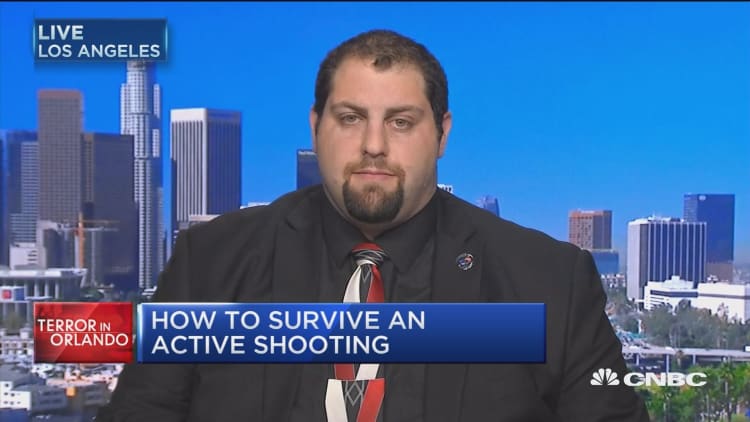As investigators look into the mass shooting that erupted at Pulse nightclub in Orlando, Florida, over the weekend, killing 49 people and injuring dozens more, security experts are working to determine how these types of tragedies can be prevented.
"What bar owners need to realize is that this not a new puzzle to solve," Robert Smith, CEO of Nightclub Security Consultants, told CNBC.
Smith, who spent 20 years with the San Diego Police Department, runs a premises liability consulting firm out of California that specializes in training bouncers and security guards. While his company covers the typical training courses for narcotics recognition and sales, identifying a fake ID and problem solving, it also provides a course on how to deal with an active shooter.
Smith said traditional training protocols following events like the 1999 Columbine High School shooting have taught people to "hunker down and hide and wait for the good guys to come." However, he recommends another mantra: Run. Hide. Fight.
"If you can run away — do it and take others with you," Smith said. "If you can't run, find a good hiding place and try to barricade yourself. If the attack on you is imminent, seriously consider fighting back with any and all means."
Smith noted that during the attacks on Paris last year, when more than 100 people were killed, suspects were able to empty and reload their weapons without interference from bystanders. He suggests that citizens don't need specialized training to take down a gunman — they just need to use their instincts.

While Smith's training is predominately focused on reacting to an armed threat, Cynthia Harris, a premises liability consultant with THG Consultants in Atlanta, Georgia, advises her clients about preventative techniques.
Whether it's a bar, nightclub, church or school, business owners need to assess inherent threats to their location based on local crime rates and previous incidents.
"Businesses that are specific to a certain group that has been targeted with hate crimes could continue to be a target," Harris said. Her firm also suggests that clients take steps to make so-called "soft targets" less vulnerable.
Harris noted that businesses can strengthen security protocols by instituting pat-downs or metal detection devices at entrances; stipulating that music in the location is turned off during an altercation; and training staff regularly to deal with threats.
Both Smith and Harris said that a major vulnerability for bars and nightclubs, specifically, is the time at which these locations close.
"Clubs have to come to grips that they are very vulnerable at the end of the evening when they are closing," Harris said, explaining that not only have the patrons at the business likely been drinking, but the staff is nearing the end of their shifts and could be tired and less vigilant.
"The thing you have to look at in these situations is how can you minimize the number of lives lost," she added.


